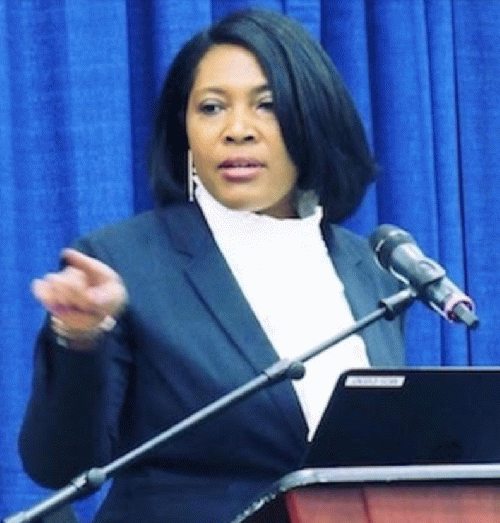The dire conditions of Michigan school districts, like Flint, Detroit, and Benton Harbor school districts that mainly serve children of color and low-income children, have recently gained much media attention and "justified" calls for school closures, district dissolutions, annexations, etc. Most of this attention has oversimplified, masked, and caused residents to overlook the real root causes of the bleak school conditions.
We must never forget that in 2014, in Flint, MI, decisions made, mainly, by state-appointed officials as a "budget-fix" tactic led to children drinking lead-laced water for 18 months and increasing blood lead levels. A wealth of research shows that even a small amount of lead in a child's body can cause serious health problems, including lower academic performance and delinquent behavior. Reports show that parents immediately began pulling their children from Flint Community Schools and children requiring Individualized Education Plans (IEP) grew at a record pace in relation to the total student population. The decline in enrollment has caused a substantial loss in school revenue, while the increase in the percentage of students with special needs has placed an excessive strain on the financial resources of Flint community schools.
A recent financial audit report for Flint Community Schools District shows that its general fund expenses exceeded revenue by $6.6 million. While there was a dramatic drop in student enrollment between 2014-15 and 2018-19 there was a needed increase in hiring. Recently, in the media and the community, there have been talks of school-building closures, dissolution of the school district, or annexation of Flint Community Schools as a solution to the financial deficit. These "solutions", especially building closures, ignore the fact that school-building closures have historically led to greater student losses, and a consequential loss in revenue. Furthermore, it presents a false narrative that the dire conditions of Flint schools, like other districts that serve our children of color and low-income children, are solely due to misspending, overspending, or even corruption and ineptness on the part of local school leadership.
Placing focus here also causes an overshadowing of the fact that inequitable funding is greatly at play in Flint. For instance, Flint Community Schools receives a portion of special education cost-reimbursement funding through a countywide millage that all Genesee County taxpayers must pay. The Genesee Intermediate School District's (GISD) Special Education Mandatory Plan, last modified in June 2013, outlines how the millage funds are disbursed to its local districts. Grand Blanc, a neighboring much more affluent and predominantly white district, has only half the number of special-needs students as Flint but gets twice the amount of special-education millage funding from GISD. More startling is that, with a Special Education Fund Balance of over $23,000,000, including a fund for future capital expenditures, GISD is sitting on a Special Education to Fund balance that is much greater than other much larger intermediate school districts. If millage funding were distributed more equitably based on special-education populations, then Flint would receive approximately 20% of the special-education millage funding distributed throughout Genesee County versus 7.5% that it currently receives.
Just as noteworthy, Detroit Public School District, until 2017, was under control by the State of Michigan through state-appointed emergency financial mangers/emergency managers, for the most part, between 1999 and 2016. It is reported that the Detroit Public School District had a surplus over $100M in 1999 left by the local elected board before state takeover due to "unsuitable" test scores. By 2016, under state control, the surplus was blown through and a debt was created which some reports show grew to over $3.5B in operating debts and capital liabilities.
In 2016, seven courageous Detroit students filed a lawsuit, Gary B., et al. v. Gretchen Whitmer, et al., or the "Detroit Right to Literacy case", calling on the State of Michigan and this country to recognize them as equals to their counterparts who live in neighboring mostly non-white neighborhoods. Simply asking decision-makers to recognize them as deserving of having, at a minimum, classrooms with teachers and books; buildings with working heat and air-conditioning systems; and roofs that are not in disrepair and in danger of caving in on them. Recently, on October 24, 2019, the U.S. Court of Appeals for the Sixth Circuit, in Cincinnati, Ohio, heard their arguments for a basic right to literacy and an educational environment adequately supportive of learning; arguments that were refuted by Michigan Governor Gretchen Whitmer and other State defendants.
Attorneys for Governor Whitmer et al, in the appeal of the lower court's decision in the Detroit Literacy case, presented arguments that callously ignored the devastating rippling effects of the state-implemented emergency-management system that continues to plague Detroit public schools; the same emergency-management system that caused the disastrous Flint water crisis. The State's argument to deny these students their constitutional right to learn also dismisses the fact that even after the end of emergency management, it is the state that has control over the funding of all schools. Financial funding has been cut for the poorest of Michigan's children, who are majority African American and concentrated in urban areas like Detroit, Flint, and Benton Harbor. Detroit, Flint, and Benton Harbor School Districts are noted as the most economically segregated in Michigan, with Detroit noted as the most economically segregated in the country.
Even after the great efforts of Governor Whitmer to bring weighted funding for at-risk school districts, such as Detroit, Flint and Benton Harbor, the Michigan legislature has rejected this proposal. State funding per at-risk student has plunged 60% since its peak in 2001, placing Michigan last among all 50 states in per-pupil revenue growth between 1995 and 2015. Even more astonishing, Michigan opts to divert taxes into the hands and pockets of billionaire developers instead of using this revenue to lift the conditions in Detroit schools to institutions fit for learning, and provide a modest guarantee of a right to literacy. In a Crain's Detroit Business article, it is noted that public funding, which should have gone to Detroit schools, accounted for $324.1 million of the $863 million in cost to build the new Little Caesar's Arena in downtown Detroit. The diversion of funds is done despite its direct impact on the quality of school facilities particularly in the City of Detroit. Similarly, Benton Harbor faces state oversight and funding challenges, which gravely contributed to deteriorated learning environments through that school district. Like Detroit, the Benton Harbor School District was deprived of needed tax revenue to pay down debt by the creation of a tax-increment authority, which is slated to capture $125 million in sorely needed property-tax revenue that could be used for the school district.
Until we address our discriminatory funding practices head on, Michigan will continue to have an education system that fails our black and brown children and mislabels them as the failures. In the words of Detroit native and longtime school activist Helen Moore, "The conscious, intentional destruction of public education for children of color has not aroused sufficient public condemnation even among those who profess social equality goals." We must urgently address the systemic discriminatory funding of our at-risk schools and challenge media, especially local media, to go beyond pointing fingers only at local leadership while the real culprits, those charged with ensuring equitable school funding and the education of our children, are left unscathed and not held accountable.






